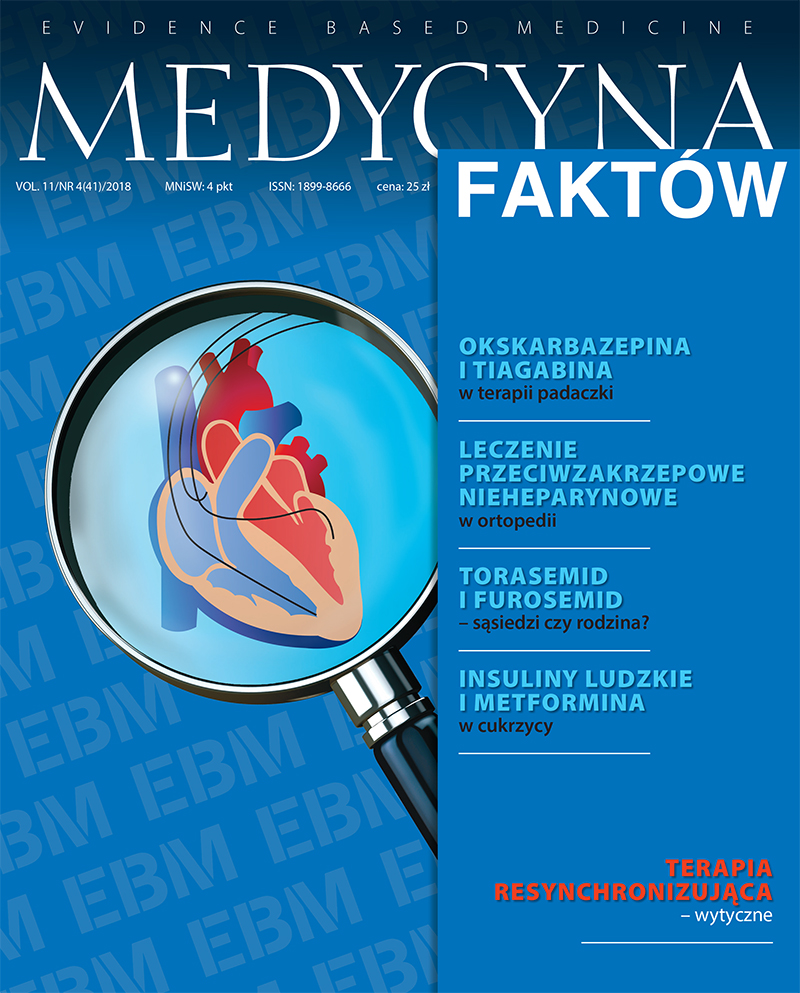Oxcarbazepine – place in the therapy of epilepsy Review article
Main Article Content
Abstract
Oxcarbazepine (OXC) is a structural analogue of carbamazepine (CBZ) with a similar mechanism of action associated with inhibition of sodium channel activation. The modifications of the structure, although small, are essential for the metabolism of the drug, its tolerance and interaction with other drugs. OXC does not show greater effectiveness than carbamazepine in focal seizures and generalized tonic-clonic seizures but is somewhat better tolerated. The main distinguishing factor of OXC is the safety of its use in pregnancy confirmed in the last EURAP analysis. Among the children of women taking OXC in different doses, the risk of congenital malformations is similar to the general population and smaller than that of carbamazepine. In addition to levetiracetam and lamotrigine, OXC is the preferred drug for use in women of childbearing age and pregnancy.
Article Details
Copyright © by Medical Education. All rights reserved.
References
2. Marson A.G., Al-Kharusi A.M., Alwaidh M. et al.; SANAD Study Group: The SANAD study of effectiveness of carbamazepine, gabapentin, lamotrigine, oxcarbazepine, or topiramate for treatment of partial epilepsy: an unblinded randomised controlled trial. Lancet 2007; 369(9566): 1000-1015.
3. Nolan S.J., Muller M., Tudur Smith C., Marson A.G.: Oxcarbazepine versus phenytoin monotherapy for epilepsy. Cochrane Database Syst. Rev. 2013; 5: CD003615.
4. Nevitt S.J., Sudell M., Weston J. et al.: Antiepileptic drug monotherapy for epilepsy: a network meta-analysis of individual participant data. Cochrane Database Syst. Rev. 2017; 6: CD011412.
5. Guerreiro M. M., Vigonius U., Pohlmann H. et al.: A double-blind controlled clinical trial of oxcarbazepine versus phenytoin in children and adolescents with epilepsy. Epilepsy Res. 1997; 27(3): 205-213.
6. Wang Y., Chen Y.B., Zhang Y.Q. et al.: Oxcarbazepine oral suspension in pediatric patients with partial seizures and/or generalized tonic-clonic seizures: a multi-center, single arm, observational study in China. World J. Pediatr. 2017; 13(6): 551-559.
7. Qin J., Wang Y., Huang X.F. et al.: Oxcarbazepine oral suspension in young pediatric patients with partial seizures and/or generalized tonic- clonic seizures in routine clinical practice in China: a prospective observational study. World J. Pediatr. 2018; 14(3): 280-289.
8. Wu D., Chen L., Ji F. et al.: The effects of oxcarbazepine, levetiracetam, and lamotrigine on semen quality, sexual function, and sex hormones in male adults with epilepsy. Epilepsia 2018; 59(7): 1344-1350.
9. EURAP Study Group: Seizure control and treatment in pregnancy: observations from the EURAP epilepsy pregnancy registry. Neurology 2006; 66(3): 354-360.
10. Battino D., Tomson T., Bonizzoni E. et al.; EURAP Study Group: Seizure control and treatment changes in pregnancy: observations from the EURAP epilepsy pregnancy registry. Epilepsia 2013; 54(9): 1621-1627.
11. Tomson T., Battino D., Bonizzoni E. et al.; EURAP Study Group: Comparative risk of major congenital malformations with eight different antiepileptic drugs: a prospective cohort study of the EURAP registry. Lancet Neurol. 2018; 17(6): 530-538.
12. Weston J., Bromley R., Jackson C.F. et al.: Monotherapy treatment of epilepsy in pregnancy: congenital malformation outcomes in the child. Cochrane Database Syst. Rev. 2016; 11: CD010224.
13. Veroniki A.A., Rios P., Cogo E. et al.: Comparative safety of antiepileptic drugs for neurological development in children exposed during pregnancy and breast feeding: a systematic review and network meta-analysis. BMJ Open 2017; 7(7): e017248.
14. Harden C.L., Pennell P.B., Koppel B.S. et al.; American Academy of Neurology; American Epilepsy Society: Practice parameter update: management issues for women with epilepsy – focus on pregnancy (an evidence based review): vitamin K, folic acid, blood levels, and breastfeeding: report of the Quality Standards Subcommittee of the American Academy of Neurology and American Epilepsy Society. Neurology 2009; 73(2): 142-149.
15. Panchaud A., Cohen J.M., Patorno E. et al.: Anticonvulsants and the risk of perinatal bleeding complications: A pregnancy cohort study. Neurology 2018; pii: 10.1212/WNL.0000000000005944.

